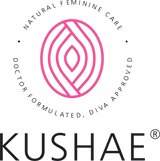This article is for informational purposes only. It is not, nor is it intended to be, a substitute for professional medical advice, diagnosis, or treatment and should never be relied upon for specific medical advice.
The one who started it all: Pads
Pads are composed of absorbent materials such as cotton or super-absorbent polymer. They stick to the inside of your underwear. Some have wings to keep the pad in place, but some womxn prefer the no-wing pads. Pads are a safer option for those who bleed heavily and do not want the risk of bleeding all over themselves. Pads are very user-friendly, especially for those who just began menstruating and are not familiar with inserting tampons or cups.
PROS of using pads:
- Safer product for heavy bleeders
- User-friendly/ beginner-friendly
- No insertion
- Have a variety of options for sizes based on flow and time of day
- Can be worn overnight - no need to change throughout the night
- May show through clothing- especially when using overnight pads
- Have to be worn with regular underwear (so it can stick down better)
- Removal is very loud
- May experience pad shifting to different sides - may result in bleeding on self or clothing
- Limits activities like swimming
- Not eco-friendly/ non-reusable
Menstrual Cups
Menstrual cups are composed of silicone or rubber and are worn inside the vagina to collect menstrual blood. They are a money saver as they are usually reusable for up to 1 to 2 years. Menstrual cups have improved the way period products work, and it can be tempting to try it at least thrice! Who is best suited for menstrual cups? For women who want to save on buying menstrual products throughout the year, be more eco-friendly, or change fewer times a day.
PROS of menstrual cups:
- Reusable - After sterilization (boiling water) or hot water and a pH-balanced feminine wash such as the Kushae Gentle 2-n-1 Foaming Wash.
- Do not disturb your pH
- Can be worn for up to 12 hours - less changing than pads and tampons, you'll likely only change once in the morning and before bed!
- Durable - Menstrual cups are known to last a lot longer than pads or tampons. A menstrual cup may last for 1 - 2 years.
- Financial Investment - Because they last for so long, you will save a lot of money from all the luxury taxes on menstrual products.
- Different sizes based on vaginal birth
- You can rock your clothes without worrying
- No embarrassing period smell
- Can swim and be freer with any activity
- Eco-friendly - Menstrual cups occupy fewer landfills and use fewer paper-based packaging
- After a correct application, you won’t feel the menstrual cup
- Now with all these pros, what are the downsides to menstrual cups? There are a few, but some of these have to deal with specifically who is using them. If it applies to you, be very careful when purchasing a menstrual cup.
CONS of menstrual cups:
- Taking out the menstrual cup can be tricky and messy with your fingers inside your vagina. - Our team at Kushae recommends washing your hands very thoroughly. Then, taking the cup out during your shower, dumping the contents inside, and washing before inserting again. It is also helpful and easier to take a menstrual cup while sitting on a toilet.
- Inserting the cup can be frustrating at first - with more use or simply viewing a tutorial on cup insertion, this problem is easily solved.
- Hard to remove
- Each time you take it out, you must sterilize it by washing it carefully.
- Womxn with fibroids may have trouble inserting the cup.
- Those with IUD must be careful with cup removal to not dislodge the cord by pulling too hard.
- Be careful with allergic reactions to silicone
- It may not last 12 hours for those who bleed heavy - it may not even last 2 hours on the heavy days. So be aware of your flow!
- It is a financial investment after the initial purchase- most cups cost about 30 dollars or higher.
Tampons
Tampons can be scary for those who just started menstruation. But there are many reasons why womxn love and continue to safely use tampons, despite the risk of Toxic Shock Syndrome. While there are some disadvantages of tampons, they are small, and that makes them more travel-friendly and discreet. We do not need everyone in our business, ladies!
PROS of Tampons:
- Discreet- it is not visible (inserted)
- When correctly inserted, tampons won't be a bother!
- Does not limit your activities- enjoy the beach or the pool without any worries
CONS of Tampons
- Toxic Shock Syndrome - A rare but life-threatening infection that may result from using super-absorbent tampons, and wearing tampons for more than the recommended time.
- To decrease the likelihood of Toxic Shock Syndrome, these are a few things you should do.
- Look at the absorbency level
- Change tampons every 4 hours to 8 hours (ALWAYS go based on the instructions of the tampons because time may vary)
- Do not sleep with a tampon on
- Use other menstrual products such as pads when the flow is light.
- Finding the correct tampons for your flow
- Can be irritative and itchy
- Insertion can be uncomfortable
- Not eco-friendly - uses a lot of plastic and paper packages
- Made with bleached cotton, which contains dioxin, a toxic chemical linked to cancer
There are a lot more options than these. Ladies, there is nothing wrong with having a preference or trying something new. Your period, your choice! As a matter of fact, if a menstrual cup is something you'd like to try, click below to enter our drawing to win a FREE menstrual cup by Kushae!

















